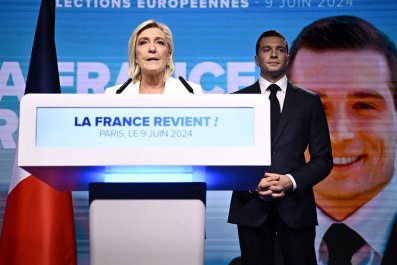The far-right National Rally has taken a strong lead in the first round of France's legislative elections.
Official Interior Ministry results showed that the party, led by Marine Le Pen, and its allies had won 33.4 percent of the vote.
President Emmanuel Macron's centrist alliance had a disappointing night, winning just 20.7 percent. The left-wing coalition came second with 27.9 percent.
French voters now face a decisive choice on July 7 in the runoff of snap parliamentary elections that could see the country's first far-right government since the World War II Nazi occupation—or no majority emerging at all.
After dissolving the National Assembly on June 9 following a defeat in the European Parliament elections, Macron had hoped to counteract the National Rally's momentum.
"The extreme right is at the doors of power," Prime Minister Gabriel Attal declared, urging voters to unite against the National Rally. The party's success in this election could enable Le Pen to install her protégé, Jordan Bardella, as prime minister, marking a historic shift in French politics.
Despite its strong showing, the National Rally's path to a parliamentary majority remains uncertain. The second round of voting, scheduled for next Sunday, will be crucial in determining whether Le Pen's party can secure the seats needed to form a government and implement their controversial policies, including halting French military support to Ukraine and rolling back Macron's pension reforms.
In the northern region of Pas-de-Calais, Le Pen and several other National Rally candidates won their districts outright, avoiding a second round. This success reflects a significant shift in voter sentiment, with many previously apprehensive about the far-right now expressing support.
However, opponents of the National Rally warn of severe repercussions if the party gains power. Macron himself has suggested that a far-right government could lead to civil unrest, citing the party's plans to expand police powers and restrict immigration. These policies have particularly alarmed France's Muslim community and other minorities.
High voter turnout, estimated at 66 percent, indicates the electorate's heightened engagement in this high-stakes election. Many voters, motivated by economic concerns and dissatisfaction with Macron, saw this as an opportunity to challenge his presidency.
Disclaimer: The copyright of this article belongs to the original author. Reposting this article is solely for the purpose of information dissemination and does not constitute any investment advice. If there is any infringement, please contact us immediately. We will make corrections or deletions as necessary. Thank you.



